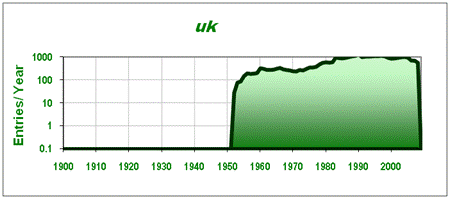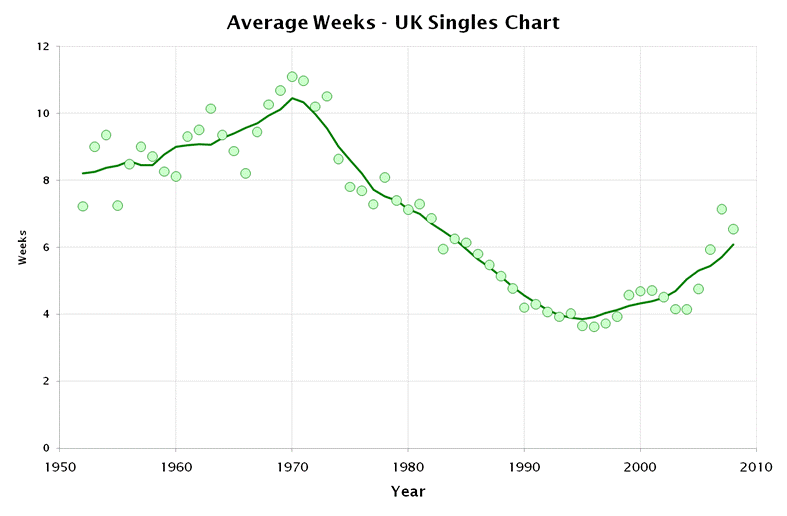| Music |
| Songs |
| Song Years |
| Song Artists |
| Song Titles |
| Song Charts |
| Albums |
| Album Years |
| Album Artists |
| Album Charts |
| Site Index |
The UK song chart

Song chart UK
The UK charts started with the one published in "New Musical Express" (1952 - 1960), then the "Record Retailer" chart (1960 - 1969) and completed with the "The Official Charts Company" (since 1969). This slightly convoluted set was originally defined in "Guinness Book of British Hit Singles" and is different from that used, for example by the BBC, before 1969, as a result some songs that were announced as number ones (for example on the TV show "Top of the Pops") are listed differently here.
This chart was found at //www.chartstats.com/ which used to be a good site for examining the UK charts (until the official chart company shut them down). Some entries have had to be corrected to bring them in line with Guiness. There are a number of other sites that provide UK chart information, however most are either restricted in access (such as //www.theofficialcharts.com/) and/or contain too many errors (such as //www.everyhit.com/).
Attributes
The attributes we use from this data are:
- artist: The artist
- name: The name of each song
- position: The peak position the song reached in the weekly chart
- date: The month in which the song first entered the chart
- weeks: The number of weeks the song was in the chart
artist
There are a wide range of ways to assign scores to artists in order to work out which artists are most significant. Here is one listing, of the top five artists of each decade within the UK chart. This has been calculated using a score that combines the position and the number of weeks in the charts.
| Decade | Number 1 Artist | Number 2 Artist | Number 3 Artist | Number 4 Artist | Number 5 Artist |
| 2000s | Westlife | The Sugababes | Girls Aloud | Britney Spears | McFly |
| 1990s | Boyzone | Madonna | Spice Girls | Oasis | Take That |
| 1980s | Madonna | Shakin' Stevens | Michael Jackson | Madness | Wham! |
| 1970s | ABBA | Rod Stewart | Slade | Elvis Presley | T Rex |
| 1960s | The Beatles | Cliff Richard | Elvis Presley | The Shadows | The Rolling Stones |
| 1950s | Elvis Presley | Frankie Laine | Lonnie Donegan | Guy Mitchell | Pat Boone |
If we want to compare artists across the years we need to remove the systematic bias that comes from the different chart sizes for different eras. We can do that by first ording all the songs by success within a given year and then using this order to define a score (for example assigning 1.0 to the number 1 song, 0.5 to the number 2 and so on).
| # | Artist | Entries | Biggest Hit | Year | Year Position |
| 1 | Elvis Presley | 153 | Wooden Heart | 1961 | 2 |
| 2 | The Beatles | 43 | She Loves You | 1963 | 1 |
| 3 | Cliff Richard | 125 | Living Doll | 1959 | 2 |
| 4 | Madonna | 66 | Music | 2000 | 2 |
| 5 | Kylie Minogue | 40 | I Should Be So Lucky | 1988 | 1 |
| 6 | Roy Orbison | 34 | Only The Lonely (Know The Way I Feel) | 1960 | 1 |
| 7 | Frankie Laine | 24 | I Believe | 1953 | 1 |
| 8 | Rod Stewart | 59 | Sailing | 1975 | 1 |
| 9 | Oasis | 27 | Some Might Say | 1995 | 1 |
| 10 | Frank Sinatra | 35 | My Way | 1969 | 1 |
| 11 | ABBA | 28 | Mamma Mia | 1975 | 2 |
| 12 | Michael Jackson | 50 | Earth Song | 1995 | 3 |
| 13 | Steps | 22 | Heartbeat | 1998 | 1 |
| 14 | Take That | 20 | Shine | 2007 | 2 |
| 15 | Boney M | 22 | Rivers Of Babylon | 1978 | 1 |
| 16 | Engelbert Humperdinck | 18 | Release Me (And Let Me Love Again) | 1967 | 1 |
| 17 | The Everly Brothers | 34 | All I Have To Do Is Dream | 1958 | 2 |
| 18 | Connie Francis | 26 | Who's Sorry Now? | 1958 | 1 |
| 19 | Whitney Houston | 26 | I Will Always Love You | 1992 | 1 |
| 20 | Wings | 23 | Mull Of Kintyre | 1977 | 1 |
name
A number of song titles have been hits for more than one artist. Here are the twenty titles that have spent the most weeks in the UK charts. Twenty four artists have had hits with songs called "Crazy"!
| # | Song Title | Total Weeks | Num Versions |
| 1 | My Way | 175 | 6 |
| 2 | Crazy | 126 | 24 |
| 3 | I Believe | 124 | 17 |
| 4 | Heartbeat | 123 | 16 |
| 5 | Why? | 119 | 16 |
| 6 | Chasing Cars | 117 | 1 |
| 7 | Stay | 113 | 19 |
| 7 | Unchained Melody | 113 | 8 |
| 9 | Shine | 109 | 12 |
| 10 | The Power Of Love | 105 | 8 |
| 11 | Angel | 101 | 18 |
| 12 | Amazing Grace | 94 | 2 |
| 13 | My Love | 90 | 11 |
| 14 | Girlfriend | 82 | 8 |
| 14 | Mama | 82 | 8 |
| 16 | Valerie | 78 | 3 |
| 16 | Rehab | 78 | 2 |
| 18 | Light My Fire | 77 | 6 |
| 19 | Relax | 76 | 4 |
| 19 | Umbrella | 76 | 2 |
position

The peak position that songs reached in the UK charts shows the expected smooth curve from number one to 100, in contrast to that displayed by the Billboard data. This suggests that the data has not been subjected to the same level of "fiddling" that the Billboard charts are.
date
The month in which a song first entered the UK chart.
weeks

The number of weeks that the average song spends in the UK chart has changed quite dramatically over the years, from well above 10 weeks in the late 1960s to less than 4 in the mid 1990s. Again this is in contrast to the Billboard charts (where the average duration was increasing during the same period). We have no good idea why this should be.
The comments here are from the the MusicID impact site site. This version is not able to accept comments yet
4 May 2021
Fast moving UK / slow US charts 90s
Hello,
You state on the UK Song Chart page that you have no idea why the time that songs spent the least time (1990s) in the UK chart was in contrast to a USA's increasing length on the chart. I have a suggestion.
One reason this would be is the start of the UK 1st-week discount (£1.99 for one week only as opposed to £3.99 thereafter) to aid high new entries. This skewed the sales to the start of the chart run, so they dropped pretty quickly making room for more cheap 1st-week entries. UK Charts are also exclusively sales, where US Charts take into account direct radio play, and records stay on playlists longer than they sell for! Also being commercial stations, the popular ones really stick around. The UK had no national commercial stations at the time, only the non-commercial BBC 1 and 2. Being driven by directors' decisions on playlisting rather than ratings to earn ad revenue, they could afford to change them quickly (or slowly) in line with station policy and not worry about change in income or ratings. In the 90's, BBC Radio 1 was keen to be seen as a front-line station for new music. Music doesn't stay new for long, so although they have for years before and ever since had their weekly playlist meeting, the records on it changed faster then. I think R1 programers are a bit more risk averse these days. Streaming and other platforms in general have caused the chart to slow back down again! Algorithms directing you to the same old/similar stuff, people playing them and counting towards charts for longer periods (the 90's would only count the day of first purchase) etc. Hope this is of use Regards -- David Carbines
Reply;
Sounds like a good suggestion, thanks